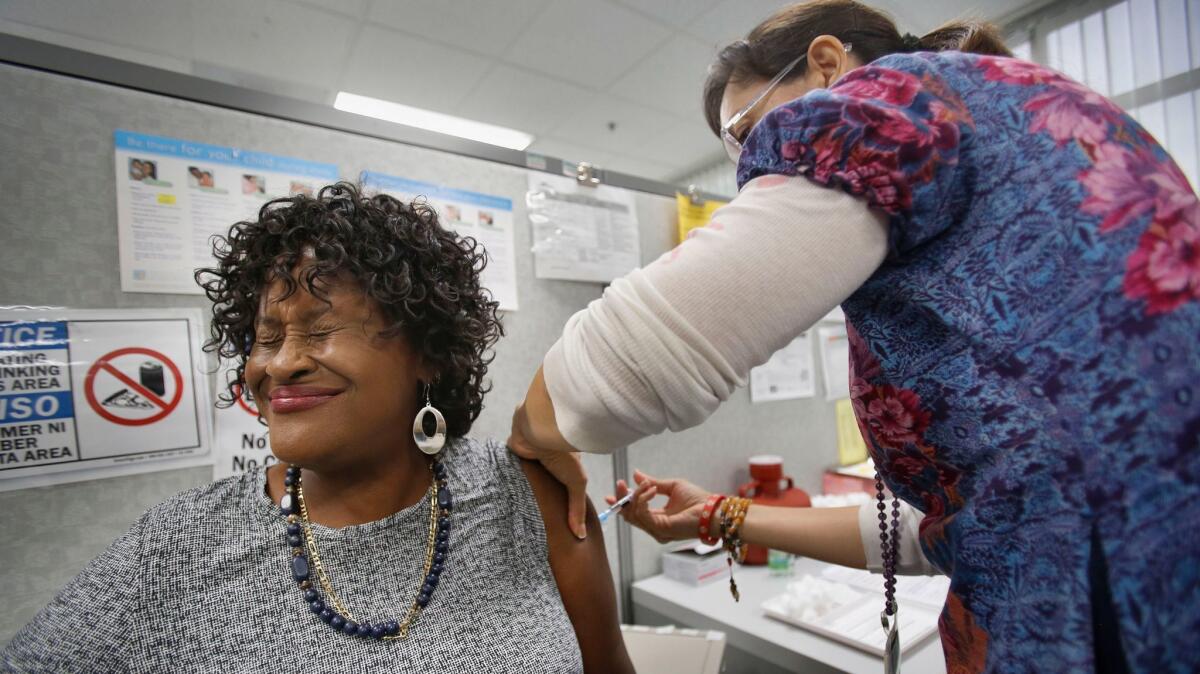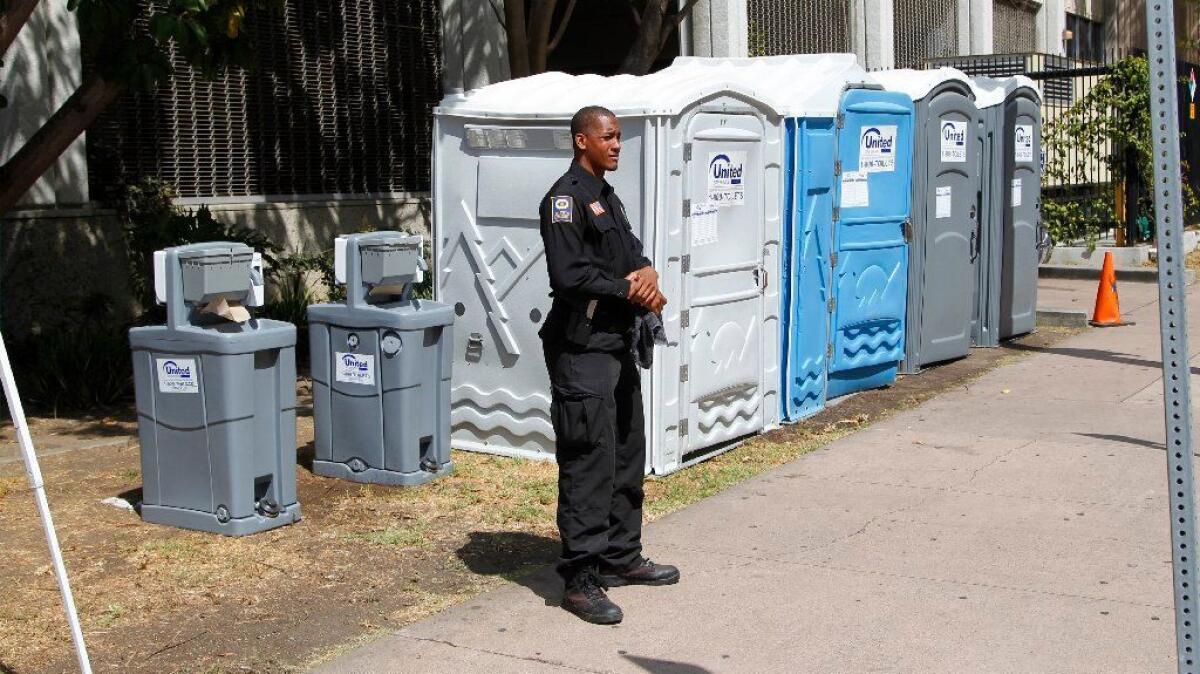Restaurants, diners taking precautions after latest hepatitis A scare

- Share via
San Diego — A day after news that San Diego’s deadly hepatitis A outbreak may have infiltrated the food service industry, more than 200 people lined up for vaccinations, restaurants reinforced their health safety measures and the city opened a new set of portable public restrooms downtown in an effort to gain some control over the disease’s spread.
“All eyes are on San Diego,” Steve Zolezzi, president of the Food & Beverage Association of San Diego, said of the outbreak, one of the nation’s largest in decades which prompted county officials to declare a local public health emergency earlier this month.
Miguel Valle, a 65-year-old resident of East San Diego, was one of dozens who lined up early to get a free vaccine at the county’s North Central Public Health Center Saturday, many of them fearful they may have been exposed at a Pacific Beach restaurant.
“I’ve got things to do this morning but I wanted to get this taken care of, get some peace of mind,” said Valle.
On Friday, San Diego County health officials advised the public that anyone who ate or drank at the oceanfront World Famous restaurant on seven specific dates and times may have been exposed to a person with the hepatitis A virus.
Valle and nine of his friends ate appetizers at the restaurant on Aug. 28, one of the dates on the list.
“I’m a little angry because I have to go through this, but I’m not faulting the restaurant,” said Valle. “It’s better to be safe than sorry.”
Keith Knight, 52, of Pacific Beach agreed: “It’s easier to be vaccinated than to be treated.”
By the time the health center closed at 2 p.m., 225 people had received inoculations.
“We’re in the midst of an outbreak and anybody who comes here who wants to get the shot, even if they didn’t eat at the restaurant, we’re going ahead and giving them the shot,” said Dr. Eric McDonald, director of the county’s Epidemiology and Immunization Services Branch.
Erik Berkley, general manager at World Famous, said Saturday it has not been confirmed if the person connected to the restaurant does in fact have hepatitis A. He would not say if the person is an employee, “because I want to protect that person as much as I can.”
“What we do know is, the individual in question, that person’s spouse was confirmed to have the virus,” Berkley said.
World Famous shut its doors last Tuesday after being notified of possible exposure. Berkley said county health inspections found no evidence of hepatitis contamination, but the restaurant, in an abundance of caution, hired a private hazardous materials company to perform a deep cleaning.
World Famous reopened Wednesday and a slow but steady of stream of customers showed up Saturday.
Business “has been off a little bit, which is natural I think in this scenario, but the community’s been wonderful and there’s been a lot of support for us,” Berkley said.
The latest development added another level of anxiety in a health crisis that has put an increasing number of San Diego-area residents on edge.
The outbreak of hepatitis A, a liver infection caused by a virus that is highly contagious, has killed at least 16 people in the area and at least 421 cases have been detected, leading to 292 people being hospitalized.
The homeless population has been hit especially hard. The use of sidewalks and public rights of way as toilets has created unsanitary conditions that health officials believe have contributed to the spread of the disease.
On Saturday morning, the city announced new public restrooms have been opened downtown and more are on the way.

Four new portable restrooms have been placed near City Hall at First Avenue and C Street. The city says they will be maintained at least twice a day and will be monitored by 24-hour security. A hand-washing station is nearby.
The city said it also plans to identify additional sites for restrooms in the coming weeks on top of the 20 public restroom facilities currently downtown.
To that end, the city is asking downtown property owners to contact the city if they have space for a portable restroom, particularly if their land is near “at-risk populations.”
“The installation of more public restrooms is important to stop the spread of hepatitis A,” Jonathan Herrera, the city’s senior adviser on homelessness coordination, said in a statement. “This is one of the many steps the city is taking to assist the County of San Diego in addressing this public health emergency.”
The warning regarding the restaurant in Pacific Beach has raised concern about the outbreak possibly spilling over into the food service world.
“The more cases you have in the community, the more spillover you’re going to have to people who are not homeless,” said Dr. Michael Osterholm, director of the Center for Infectious Disease Research and Policy at the University of Minnesota.
But he said that it’s quite difficult for the virus to move from food workers to diners.
“Transmission is not a given. It’s a very rare event,” Osterholm said in an interview. “Work we’ve done here has found that transmission occurs in probably less than 1 percent of cases.”
It’s important to remember, he added, there is no chance of transmission if workers have clean hands when they handle food. As long as they’ve done a good job of washing up after using the bathroom and any microscopic bit of fecal matter is removed from their hands, transmission is impossible even if they’re in the infectious stage of their illness, which starts about two weeks before symptoms appear.
“The restaurant industry has to assume that every worker could transmit hepatitis A. That’s why good hygiene is especially important. If someone has hepatitis A but also good hygiene, they’re not going to transmit the virus,” Osterholm said.
Reinforcing such practices was foremost in the mind of Krystal Linnabery, the manager of Truckstop, a restaurant located just a few yards from World Famous.
“We’re taking every precaution we can,” Linnabery said. “We see people coming in off the beach and we’re not allowing them to come in with no shoes.” She said her company is telling employees to get vaccinated.
Zolezzi of the food and beverage association said restaurants have to be extra careful because they come in contact with the general public.
“We serve a lot of different people,” Zolezzi said, “and not everyone has the kind of hygiene practices they should. So that requires us to be as vigilant as we can be in operating our businesses — wiping down menus, thoroughly cleaning all of those contact points on a regular basis.”
While Linaberry said she sympathized with the management at World Famous, Arthur Karyakos, who owns three small food businesses in Pacific Beach, was less forgiving.
“We live here, we eat here,” he said at Big Kahuna’s, a shop he owns that sells ice cream and smoothies. “I’m unhappy about what happened.”
But Daniel Adams, 26, from Crown Point has lived in the Pacific Beach area his entire life and said he will remain a regular customer.
“I’ve gone there forever, I know the people that work there, I love World Famous,” Adams said. “I could go have a cocktail right now and I wouldn’t worry.”
Though considered less lethal than hepatitis B or C, hepatitis A infection can be fatal for those with pre-existing liver damage and other health conditions.
Most people, however, recover with little or no treatment. Infection can be prevented through vaccination.
Symptoms, which do not appear in all cases, include: fever, fatigue, nausea, loss of appetite, yellowing of the eyes (jaundice), stomach pain, vomiting, dark urine, pale stools and diarrhea.
The incubation period for hepatitis A ranges from 15 to 50 days.
Staff writer Paul Sisson and editor Michael Smolens contributed to this report.
Dates and times of concern for those who ate or drank at World Famous:
- Aug. 28, 29 and 30 from 3 p.m. to 11 p.m.
- Sept. 3 and 4 from 9 a.m. to 6 p.m.
- Sept. 10 and 11 from 3 p.m. to 11 p.m.
Business
(619) 293-1251 Twitter: @robnikolewski
More to Read
Sign up for Essential California
The most important California stories and recommendations in your inbox every morning.
You may occasionally receive promotional content from the Los Angeles Times.











